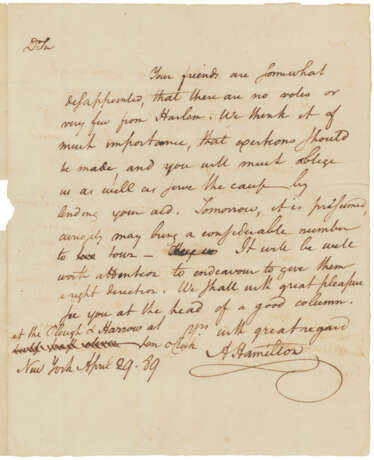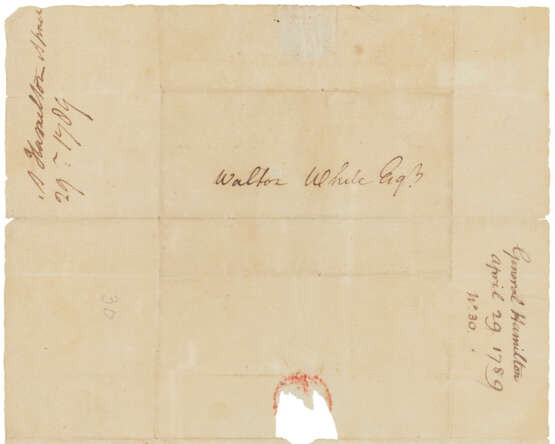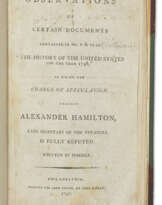ID 1360895
Лот 179 | Ensuring loyal turnout for Washington's inauguration
Оценочная стоимость
$ 8 000 – 12 000
One page, bifolium, 207 x 165mm with integral leaf addressed in his hand (seal tear loss to transmittal leaf). Encapsulated.
On the eve of Washington's first inauguration as President of the United States, Hamilton works to ensure a large crowd will be in attendance "to serve the cause…" Leveraging his correspondent's inability turn out the vote from the village of Harlem in the bitterly-fought New York gubernatorial election that saw the reelection of his rival George Clinton, Hamilton hopes that White can now make amends by assembling his neighbors to attend Washington's inauguration: "Your friends are somewhat disappointed, that there are no votes or very few from Harlem. We think it of much importance, that exertions should be made, and you will much oblige us as well as serve the cause by sending your aid. Tomorrow, it is presumed, curiosity may bring a considerable number to town — It will be well worth attention to endeavour to give them a right direction. We shall with great pleasure see you at the head of a good column."
That column, assuming his correspondent could muster one, would have been joined by the throngs who had descended on the city ever since Washington arrived by barge across the Hudson on 23 April. Early in the day, a large crowd had begun to assemble around Washington's residence at Franklin House. They, together with other onlookers who had been attending church services in the morning, followed a formal procession to Federal Hall. There, they formed a large assemblage on Broad Street affording many a view of Washington taking the oath of office on the hall's second floor balcony. Celebrations continued into the evening with lavish illuminated transparent paintings hung at the fort depicting fortitude, justice and wisdom, representing respectively, the President, the Senate and the House. Other buildings, including the Spanish and French embassies staged similar displays, topped off with a brilliant firework display lasting two hours. Washington watched the festivities from the homes of Chancellor Livingston and General Henry Knox, and at 10 in the evening, when he attempted to return to his residence, his carriage was unable to make its way through the crowds, forcing him to walk home instead.[3]
Hamilton's' concerns about turnout at the inauguration sheds additional light on the depth of Hamilton's growing partisanship at this time relative to Washington's relative neutrality as he prepared to take office. Chernow notes Hamilton's annoyance when New York Governor George Clinton had hosted a state dinner for Washington the evening of his arrival in New York: "Hamilton smarted of the deference shown to the governor, but Washington wished to convey that he would be the leader of all the people."[1] That bitterness was the result of a longtime feud with the longtime New York governor that had its origins in 1777, when his then future father-in-law, Philip Schuyler was defeated in his bid for the office by Clinton. Clinton's political hold on the state remained solid throughout the 1780s, and ran twice with no opposition, first in 1780 and then again in 1786. In 1788, Clinton led the Antifederalists as he presided over the state ratification convention. There, he advocated a new convention to heavily revise the Constitution rather than amend it under the terms of Article V, making Hamilton fearful that he would attempt to undermine the new federal government. To that end, Hamilton campaigned actively against Clinton's election as president, and in early 1789 mounted a campaign to unseat the governor. Appreciating Clinton's political dominance, rather than nominate a Federalist to run against Clinton, Hamilton and his allies nominated another Antifederalist, Robert Yates in an attempt to divide the vote. Although Clinton prevailed, it was by the narrowest margin so far (52% vs. 48%). And while Yates won New York County by a fairly wide margin, this letter indicates that Clinton remained strong in the Manhattan countryside north of New York City.
Considering the lack of political support mustered by Hamilton's correspondent, Anthony Walton White, it is most likely he did not head a "large column" on inauguration day. White, a former Continental Army officer from New Jersey and onetime (and brief) aid-de-camp to Washington, seemed to be down on his political luck at this time. He had incurred large debts during his service, and moved to New York in an effort to recover his fortunes. To that end, White wrote to Washington twice lobbying for federal posts including Collector on 1 May. When he was turned down, he wrote Washington again on 22 September seeking a post in "the Marshals Office of this State or any other appointment you may pleased to confer on me under the New Government."[2] . Likely unbeknownst to White, Washington held him in low regard. In 1775, White briefly served Washington's aide-de-camp in October 1775, but he was soon turned down, the Commander-in-Chief writing later that he could "derive no earthly assistance from such a man." During his service with several New Jersey regiments during the war, he developed a reputation for brashness, subjecting himself to several courts martial. In 1798, Washington once again turned down White's appeal for an appointment, writing "O all the characters in the Revolutionary Army, I believe one more obnoxious to the Officers who composed it … especially among those to the Southward … for being a notorious L[ia]r."[4] Provenance: Anthony Walton White — by descent to the consignor.
__________________
[1] Chernow, 277
[2] Anthony Walton White to GW, 1 May 1789 Papers of George Washington.
[3] Gazette of the United States, 2 May 1789, 4; thanks to Mount Vernon for their concise timeline: https://www.mountvernon.org/george-washington/the-first-president/inauguration/timeline
[4] Quoted in Sam K. Fore, "Anthony Walton White," https://www.mountvernon.org/library/digitalhistory/digital-encyclopedia/article/anthony-walton-white#5
| Автор: | Александр Гамильтон (1755 - 1804) |
|---|---|
| Место происхождения: | США |
| Категория аукционного дома: | Письма, документы и рукописи |
| Автор: | Александр Гамильтон (1755 - 1804) |
|---|---|
| Место происхождения: | США |
| Категория аукционного дома: | Письма, документы и рукописи |
| Адрес торгов |
CHRISTIE'S 20 Rockefeller Plaza 10020 New York США | ||||||||||||||
|---|---|---|---|---|---|---|---|---|---|---|---|---|---|---|---|
| Предосмотр |
| ||||||||||||||
| Телефон | +1 212 636 2000 | ||||||||||||||
| Факс | +1 212 636 4930 | ||||||||||||||
| Условия использования | Условия использования | ||||||||||||||
| Транспортировка |
Почтовая служба Курьерская служба Самовывоз | ||||||||||||||
| Способы оплаты |
Банковский перевод | ||||||||||||||
| Часы работы | Часы работы
|












